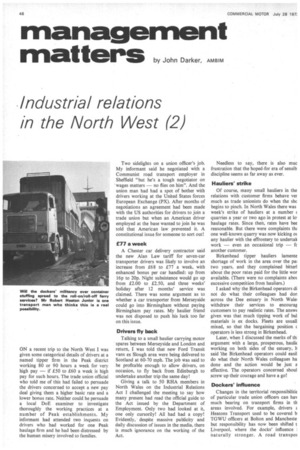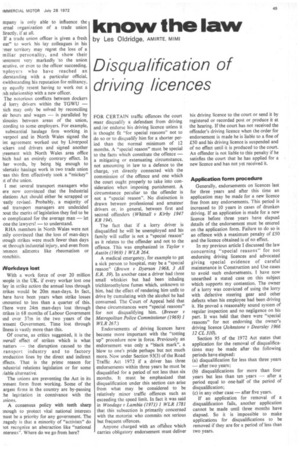management
Page 50

Page 51

If you've noticed an error in this article please click here to report it so we can fix it.
matters by John Darker AM B
Industrial relations in the North West (2)
ON a recent trip to the North West I was given some categorical details of drivers at a named tipper firm in the Peak district working 80 or 90 hours a week for very high pay — if £50 to 160 a week is high pay for such hours. The trade union official who told me of this had failed to persuade the drivers concerned to accept a new pay deal giving them a higher basic rate and a lower bonus rate. Neither could he persuade a local DoE examiner to investigate thoroughly the working practices at a number of Peak establishments. My informant had attended two inquests on drivers who had worked for one Peak haulage firm and he had been distressed by the human misery involved to families. Two sidelights on a union officer's job. My informant said he negotiated with a Communist road transport employer in Sheffield "but he's a tough negotiator on 'wages matters — no flies on him". And the union man had had a spot of bother with drivers working at the United States forces European Exchange (PX). After months of negotiations an agreement had been made with the US authorities for drivers to join a trade union but when an American driver employed at the base wanted to join he was told that American law prevented it. A constitutional issue for someone to sort out!
£77 a week A Chester car delivery contractor said the new Alan Law tariff for seven-car transporter drivers was likely to involve an increase from £68 to £77 a week, with enhanced bonus per car handled: up from 16p to 20p. Night subsistence would go up from £2.00to £2.50, and three weeks' holiday after 12 months' service was claimed. There was some argument as to whether a car transporter from Merseyside could go into Birmingham without paying Birmingham pay rates. My haulier friend was not disposed to push his luck too far on this issue.
Drivers fly back Talking to a small haulier carrying motor spares between Merseyside and London and return, I was told that new Ford Transit vans ex Slough area were being delivered to Scotland at 60-70 mph. The job Was said to be profitable enough to allow drivers, on occasion, to fly back from Edinburgh to undertake another trip the same day!
Giving a talk to 50 RHA members in North Wales on the Industrial Relations Act I challenged the meeting to say how many present had read the official guide to the Act issued by the Department of Employment. Only two had looked at it, One only cursorily! All had had a copy! Evidently,despite massive publicity and daily discussion of issues in the media, there is much ignorance on the working of the Act.
Needless to say, there is also muc frustration that the hoped-for era of sensib discipline seems as far away as ever.
Hauliers' strike Of course, many small hauliers in the relations with customer firms behave ver much as trade unionists do when the she begins to pinch. In North Wales there was week's strike of hauliers at a number c quarries a year or two ago in protest at Icy haulage rates. Since then, rates have bee reasonable. But there were complaints du one well-known quarry was now kicking oi any haulier with the effrontery to undertak work — even an occasional trip — fc another customer.
Birkenhead tipper hauliers lamente shortage of work in the area over the pa; two years, and they complained bitterl about the poor rates paid for the little wor available. (There were no complaints abet excessive competition from hauliers.) I asked why the Birkenhead operators di not do what their colleagues had don across the Dee estuary in North Wale: withdraw their services to encourag customers to pay realistic rates. The answ( given was that much tipping work of bul materials is ex docks. Fleets are usuall mixed, so that the bargaining position c operators is less strong in Birkenhead.
Later, when I discussed the merits of thi argument with a large, prosperous, haulic working on both sides of the estuary, h said The Birkenhead operators could m0 do what their North Wales colleagues ha done and the action would be just a effective. The operators concerned shoul screw up their courage and have a go!
Dockers' influence Changes in the territorial responsibilitit of particular trade union officers can hay much bearing on transport firms in tb areas involved. For example, drivers Heatons Transport used to be covered b TGWU officers at Bolton and Mancheste but responsibility has now been shifted t Liverpool, where the docks' influence i naturally stronger. A road transpot
mpany is only able to influence the ernal organization of a trade union iirectly, if at all.
If a trade union officer is given a fresh eat" to work his lay colleagues in his "mer territory may regret the loss of a miliar personality, and show their ;entment very markedly 'to the union ecutive, or even to the officer succeeding. nployers who have reached an Lderstanding with a particular official, ,twithstanding his reputation for militancy, ay equally resent having to work out a :sh relationship with a new officer.
The notorious conflicts between dockers .cl lorry drivers within the TGWU — -tich may only be solved by reconciling eir hours and wages — is paralleled by alousies between areas of the union, cording to some employers. For example, substantial haulage firm working in verpool and in North Wales signed the int agreement worked out by Liverpool )ckers and drivers and signed another ;reement with North Wales area office Filch had an entirely contrary effect. In her words, by being big enough to idertake haulage work in two trade union 'eas this firm effectively took a "mickey" it of the union.
I met several transport managers who ere now convinced that the Industrial elations Act should either be scrapped or .eatly revised. Probably, a majority of iad transport managers are undecided ,out the merits of legislation they feel to be lo complicated for the average man — let one the lawyers! — to understand.
RHA members in North Wales were not isily convinced that the loss of man-days 'rough strikes were much fewer than days ist through industrial injury, and even from 3mmon ailments like rheumatism or ronchitis.
Workdays lost With a work force of over 20 million maple in the UK, if every worker lost one lay in strike action the annual loss through trikes would be 20m man-days. In fact, here have been years when strike losses imounted to less than a quarter of this. ['here were 24m man-days lost through itrikes in 68 months of Labour Government Ind over 37m in the two years of the resent Government. Time lost through llness is vastly more than this.
Of course, as critics suggested, it is the werall effect of strikes which is what natters — the disruption caused to the ransport industry and to factory roduction lines by the direct and indirect :ffects. That is the prime reason for ndustrial relations legislation or for some Tiable alternative.
The unions are preventing the Act in its resent form from working. Some of the argest firms in the country are by-passing he legislation in connivance with the mions.
A consensus policy with teeth sharp mough to protect vital national interests nust be a priority for any government. The .ragedy is that a minority of "activists" do lot recognize an abstraction like "national nterests". Where do we go from here?




























































































